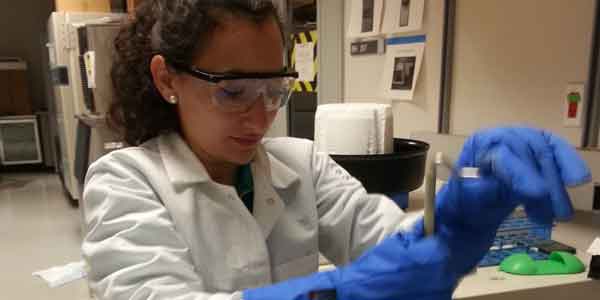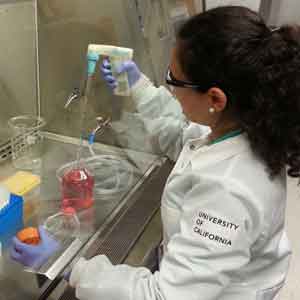A handful of
subscribers may have inadvertently received a sneak preview of this week’s Science
First, which was distributed ahead of schedule due to a glitch last week. We apologize for any inconvenience, but we want to make sure everyone hears about Karen Samy’s great work.

This week’s Science First highlights the work of Karen Samy, a current recipient of an
International Foundation for Ethical Research (IFER) Graduate Fellowship for
Alternatives to the Use of Animals in Science.
IFER Graduate Fellowships
are awarded annually, through support from the National Anti-Vivisection
Society (NAVS), to early career scientists who are developing alternatives to
the use of animals in product testing, biomedical research and education.
Karen’s project, which is aimed at
developing a three-dimensional cell-based model to mimic the microenvironment
of the intestine to perform drug permeability studies, expands upon work
conducted by a former IFER fellowship recipient, Erica Schlesinger.
Because most medicines are delivered orally,
it is important that a drug’s intestinal absorption be carefully characterized,
as this helps researchers understand how suitable the drug is for oral dosing.
A number of models are currently used for these tests, including two-dimensional
in vitro models and in vivo animal models. Both approaches
have limitations that Karen’s work hopes to overcome.
“The existing in vitro
standard, the 2-D Transwell model, does not recapitulate the complex in vivo environment of the small
intestine,” Karen notes, “which leads to a lack of correlation between
permeability measurements from the model and absorption observed in vivo for low permeability compounds.”
And use of animal models has its limitations too. “The use of animals as
in vivo models is complicated by
differences in intestinal physiology across the different species,” says Karen.
“Moreover, there are a lot of ethical as well as cost considerations associated
with using animals in drug testing.”
With support from IFER, Karen, under the mentorship of Dr. Tejal Desai
at the University of California San Francisco, is creating a human-relevant
model mimicking the intestinal microenvironment, which she hopes will overcome
limitations of existing models. She designed a permeable tubular scaffold and
has successfully cultured human intestinal cells in a continuous monolayer on
the inside. She is now in the process of testing multiple drugs to assess their
permeability across the scaffold in an effort to see how those permeability
values compare to values obtained in vivo.

Once her model is optimized, Karen hopes that pharmaceutical companies
will use it to test the intestinal permeability of new drugs in order to predict their in vivo absorption
across the gut wall. “This would help limit the use of animals in early
drug testing and improve the efficiency of the drug development process,” Karen
notes.
Karen strongly believes that as in vitro models improve to better
reflect the complexity seen in vivo, reliance
on animal models will be lessened. She plans to continue to contribute to this
area of research even after completion of her Ph.D., and hopes to develop a
complex in vitro system which would
link together multiple organ models for use in studies of drug absorption and
metabolism.
NAVS is grateful for the contribution that
Karen Samy is making toward the development of animal-free drug testing models.
We wish her continued success in her efforts to advance science without harming
animals.
Please click here to learn more
about Karen's project.
Help NAVS
and IFER support smarter science—such as Karen's—that advances discovery,
innovation and human-relevant solutions without the use of harmful, flawed and
costly animal experiments.
DONATE 
|